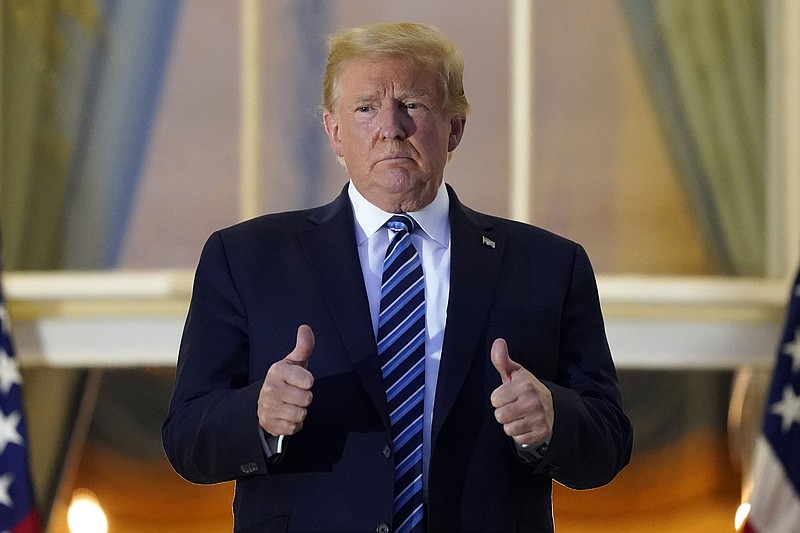When the news broke that President Trump and the First Lady had been diagnosed with the coronavirus, some Americans offered prayers for his recovery while others hoped the diagnosis would change his dismissive attitude about the virus. It's too soon to say whether the president has fully recovered since the virus can be devilishly unpredictable.
But that hoped-for change in Trump's thinking? Look no further than Tuesday's tone-deaf messaging from the White House: "Don't be afraid of Covid. Don't let it dominate your life."
This following the continuing updates on the virus: It has killed more than 210,000 Americans, and it's spreading in the White House and in many states. Who is not afraid? Who doesn't feel dominated by the virus?
Ask everyone who has lost friends and family members. Ask those whose jobs have disappeared or whose businesses have collapsed. Ask every parent worried that virtual classrooms could compromise their children's education.
What's irritating about the presidential bromide is that it reinforces what we've come to know about our president - his seeming inability to convey either sympathy or empathy.
On a different front the same day, Federal Reserve Chair Jerome Powell warned that if Congress doesn't quickly provide additional stimulus support to businesses and individuals suffering the effects of the virus, the nation's economy could suffer "tragic" results.
Hours later, Trump halted the stimulus negotiations by his Treasury secretary and House Speaker Nancy Pelosi - explaining, as The New York Times reported, that the economy is "doing very well" and "coming back in record numbers," so presumably no more help was necessary.
But wait. He also tweeted that "immediately after I win, we will pass a major Stimulus Bill that focuses on hardworking Americans and Small Business."
In other words, for now, folks, you're on your own.
All this is occurring amidst a health crisis caused by a virus that doesn't care about your race, your age or whether you're rich or poor. It is unforgiving. It is relentless. And its only enemy is an effective vaccine, which Trump has promised will arrive "momentarily."
Apparently this is what passes for presidential leadership nowadays.
The truth is, Trump's "leadership" is feckless, inconsistent and often retributive. Meaning he governs by fear, caprice and incipient authoritarianism.
Historian Doris Kearns Goodwin presented an inspiring contrast to such governance in her 2018 book, "Leadership in Turbulent Times." She describes how the leadership provided by two Republican and two Democratic presidents - Abraham Lincoln, Theodore Roosevelt, Franklin Roosevelt and Lyndon Johnson - enabled them to guide the country through crises that had engulfed the lives of nearly all Americans.
For Lincoln, it was the Civil War. For FDR, the Depression and World War II. And though Vice Presidents Roosevelt and Johnson were thrust into power by two presidential assassinations, they drew on their earlier successes to become effective leaders in their own time.
The details of how all four men met their respective challenges make for a compelling account of leadership, the likes of which America needs right now.
In her foreword Goodwin quotes Abigail Adams's letter to her son, John Quincy Adams: "It is not in the still calm of life that great characters are formed. [T]he habits of a vigorous mind are formed in contending with difficulties."
Goodwin's comment echoes that: "While the nature of the era a leader chances to occupy profoundly influences the nature of the leadership opportunity, the leader must be ready when that opportunity presents itself."
The men she profiles provided leadership that contrasted sharply with that of their predecessors - Presidents James Buchanan, William McKinley, Herbert Hoover and John F. Kennedy, respectively.
It's something to keep in mind in the next presidential election a few weeks hence.
Michael Loftin is a former opinion page editor of The Chattanooga Times.
